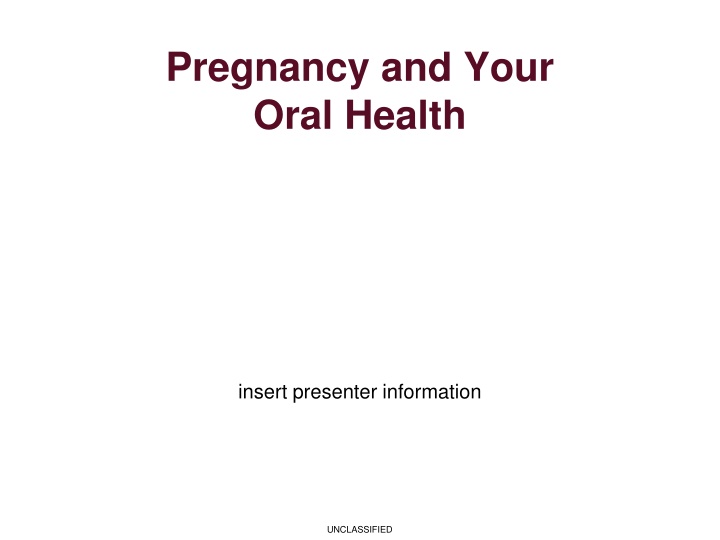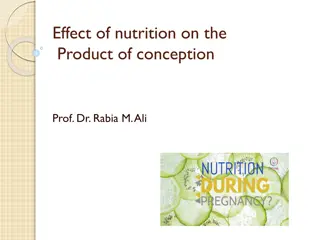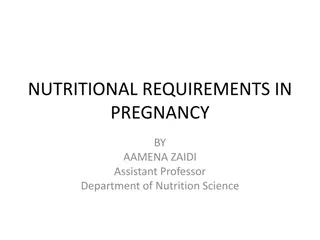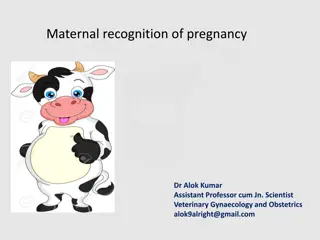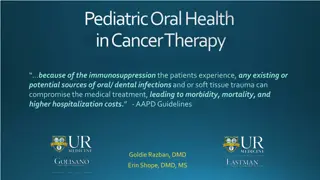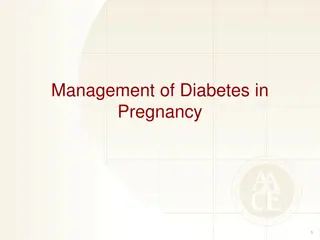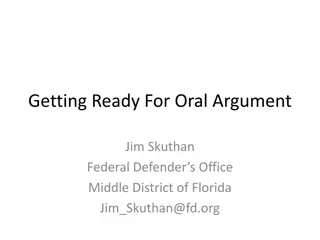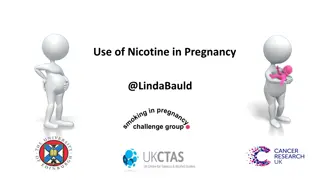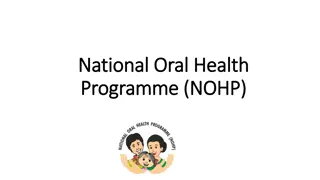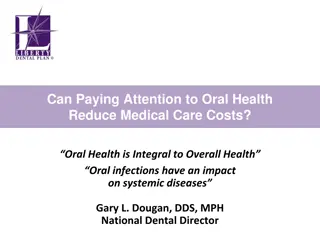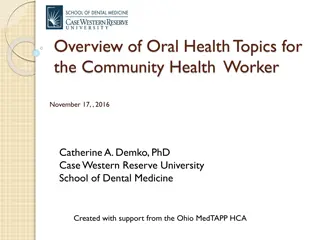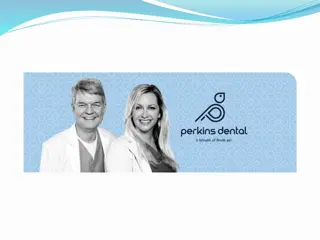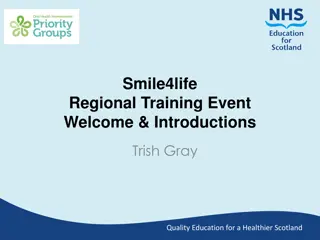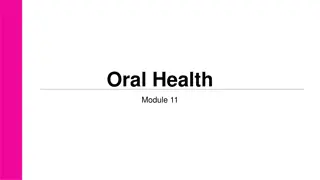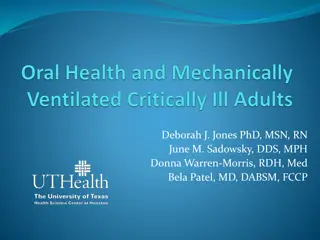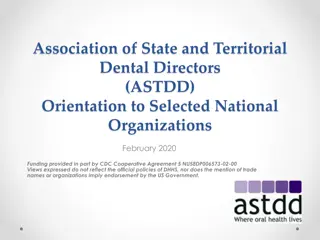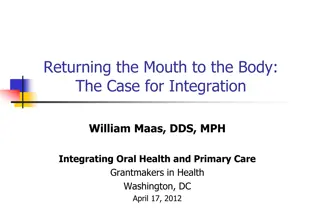Oral Health Tips During Pregnancy
Taking care of your oral health during pregnancy is crucial for both you and your baby. Regular dental check-ups and cleanings are recommended, and it's safe to visit the dentist for most procedures, especially during the second trimester. Understanding how pregnancy impacts oral health, safe dental treatments, fetal growth and development, orofacial clefts, and childhood enamel hypoplasia can help you maintain a healthy smile throughout your pregnancy journey.
Download Presentation

Please find below an Image/Link to download the presentation.
The content on the website is provided AS IS for your information and personal use only. It may not be sold, licensed, or shared on other websites without obtaining consent from the author.If you encounter any issues during the download, it is possible that the publisher has removed the file from their server.
You are allowed to download the files provided on this website for personal or commercial use, subject to the condition that they are used lawfully. All files are the property of their respective owners.
The content on the website is provided AS IS for your information and personal use only. It may not be sold, licensed, or shared on other websites without obtaining consent from the author.
E N D
Presentation Transcript
Pregnancy and Your Oral Health insert presenter information UNCLASSIFIED
When should I see the dentist? You could hurt yourself or your baby by NOT going to the dentist Go any time for: Check-ups and cleanings Emergency care (including x-rays) Second trimester or first half of third is best for procedures that require: Anesthesia Medication Time in the chair Pregnancy and Your Oral Health UNCLASSIFIED
Safe Dental Treatment Most treatments considered safe Acceptable drugs Dental anesthetics Chlorhexidine rinse Fluoride treatment Tylenol Give dentist your obstetrician s contact information Avoid Aspirin or ibuprofen Tetracyclines, chloramphenicol Pregnancy and Your Oral Health UNCLASSIFIED
Fetal Growth and Development Development of the mouth (prior to birth): 4-5 weeks primary (baby) tooth buds 4-7 weeks lips 8-12 weeks roof of mouth 12 weeks primary teeth start to harden 6 months - permanent tooth buds Pregnancy and Your Oral Health UNCLASSIFIED
Orofacial Clefts Cleft Lip and Palate Cleft lip can form by the 8th week Cleft palate can form by the 12th week Usually accompanied by misshapen or missing teeth Difficulty nursing/eating Requires multiple corrective surgeries Increases risk of ear infections Causes: Family history (genetic) Diabetes Smoking tobacco Certain medicines to treat epilepsy, such as topiramate or valproic acid Pregnancy and Your Oral Health UNCLASSIFIED
Childhood Enamel Hypoplasia What is it? Deformed, weak enamel Disruptions of tooth development Teeth can decay more easily Causes in utero: Fever in the pregnant mother Premature birth Low vitamin D levels Causes early in life: Low birth weight Fever in infancy Pregnancy and Your Oral Health Diann Bomkamp, RDH, BSDH, Missouri UNCLASSIFIED
Who Wants a $1,000,000 $mile? When is it safe to go to the dentist during pregnancy? A. When you need a check-up or a cleaning B. Only during the second trimester C. When something hurts D. A and C Pregnancy and Your Oral Health UNCLASSIFIED
Changes During Pregnancy that Alter Oral Health Hormonal Alterations: Increased tooth mobility Saliva changes less protective Increased bacteria Gum problems Pregnancy and Your Oral Health UNCLASSIFIED
Saliva changes Decreased buffers Decreased minerals Decreasing flow first and last trimester Increased flow second trimester More acidic Pregnancy and Your Oral Health UNCLASSIFIED
Increased Bacteria Increased acidity Increase in decay-causing bacteria Increased Snacking Morning sickness/low blood sugar Between-meal snacks Increase in amount and frequency of starches/carbohydrates Crackers are commonly recommended Promotes decay-causing bacteria Pregnancy and Your Oral Health UNCLASSIFIED
Disclosed Plaque Pregnancy and Your Oral Health Courtesy Proctor & Gamble UNCLASSIFIED
Increased Bacteria - Dental Decay Courtesy Diann Bomkamp, RDH, BSDH, Missouri Pregnancy and Your Oral Health UNCLASSIFIED
Diet and Dental Caries Regular Meals (M) Regular Meals (M) plus Sweet Snacks (S) Plaque Acid Levels Pregnancy and Your Oral Health Courtesy Proctor & Gamble UNCLASSIFIED
Who Wants a $1,000,000 $mile? What is a cavity? A. A large hole in the head B. A disease C. A hole in the tooth D. Both B and C Pregnancy and Your Oral Health UNCLASSIFIED
Increased Oral Bacteria During Pregnancy Increased food supply frequent meals/snacks Increased hormones Gingival fluid and saliva contain hormones Cause gums to swell, bleed easily, and secrete more fluid Bacteria use hormones for energy to grow and multiply Decreased immune response limits mouth s ability to fight bacteria Pregnancy and Your Oral Health UNCLASSIFIED
Gum Problems Pregnancy Gingivitis Red edges Swollen or puffy Tender Bleed easily during brushing Pregnancy and Your Oral Health Courtesy of Phoenix College UNCLASSIFIED
Gum Problems - Pregnancy Granuloma Pregnancy and Your Oral Health Courtesy of Univ. of Southern California UNCLASSIFIED
Gum Problems - Pregnancy Granuloma Pregnancy and Your Oral Health Courtesy of Univ. of Southern California UNCLASSIFIED
Gum Changes - Pregnancy Granuloma Pregnancy and Your Oral Health Courtesy of Univ. of Southern California UNCLASSIFIED
Who Wants a $1,000,000 $mile? Some signs of gum disease are A. Red, scaly patches B. Black, hairy patches C. Bleeding, swelling or tenderness D. None of the above Pregnancy and Your Oral Health UNCLASSIFIED
Changes During Pregnancy that Affect Oral Health Morning sickness Difficulty with hygiene Gum disease Tooth decay Vomiting Esophogeal Reflux (heartburn) Acid exposure Irritation of the gums Weakening of tooth enamel Dental erosion Pregnancy and Your Oral Health UNCLASSIFIED
Treatment for Acid Exposure Do NOT brush immediately after vomiting Rinse Water with baking soda Antacid Plain water Eat some cheese Ask about fluoride rinse or gel Pregnancy and Your Oral Health UNCLASSIFIED
Oral Diseases Can Effect Pregnancy Periodontal (gum) disease linked to: Pre-eclampsia Preterm birth Low birth weight Dental cleaning to remove calculus (tartar) is safe for pregnant women and can treat gum disease. Pregnancy and Your Oral Health UNCLASSIFIED
Prevention: Oral Hygiene Reduce the amount of bacteria in your mouth. Brush at least twice a day with fluoride toothpaste Floss once a day Antibacterial mouth rinses Xylitol gum or mints after snacks (sugary drinks count as a snack!) Keep routine dental visits! TRICARE Dental Program pays for 3 checkup/cleaning visits during pregnancy Pregnancy and Your Oral Health UNCLASSIFIED
Prevention: Nutrition for Oral Health Snack smart Eat well-balanced meals Avoid starchy or sugary snacks and drinks B vitamins, especially folate (folic acid) Raw fruits and vegetables Vitamin C Dairy products Vitamin D Calcium Protein Fiber Pregnancy and Your Oral Health UNCLASSIFIED
Who Wants a $1,000,000 $mile? Oral diseases can be prevented by A. Using fluoride rinse B. Brushing with fluoride toothpaste 2-3 times a day C. Eating nutritious foods D. A and B E. All of the above Pregnancy and Your Oral Health UNCLASSIFIED
Acknowledgements COL Georgia Rogers Consultant to the Army Surgeon General for Dental Public Health Additional graphics or information provided by the following: Diann Bomkamp, RDH, BSDH, Missouri WI Dept. of Health and Family Services University of Southern California Phoenix College Proctor & Gamble Dr. Luke Shwart, Calgary Health Region Pregnancy and Your Oral Health UNCLASSIFIED
